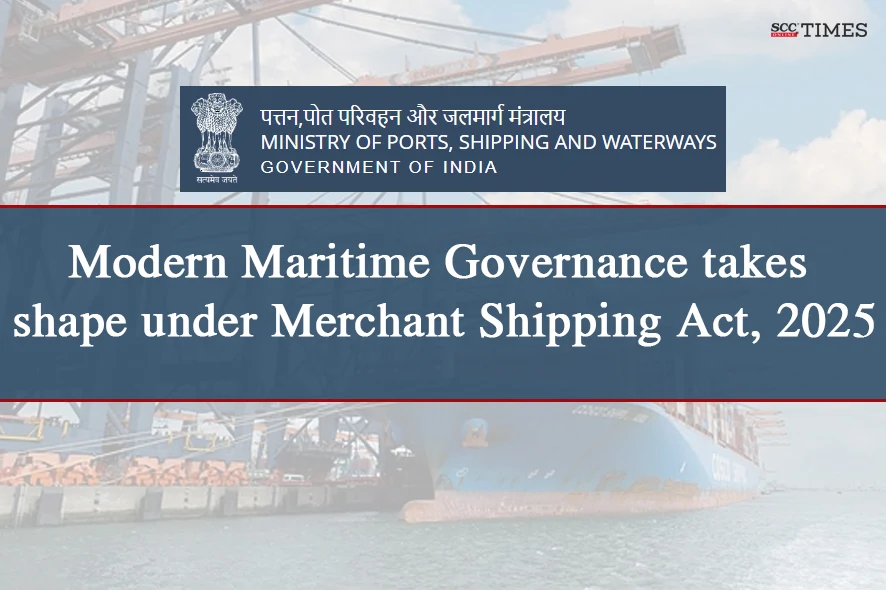On 18-8-2025, the Government issued the Merchant Shipping Act, 2025 aimed at streamlining maritime governance with a modern and internationally compliant framework. First introduced on 10-12-2024, the Act replaces the Merchant Shipping Act of 1958, which had become outdated and fragmented in its approach to contemporary maritime challenges.
Background:
While introducing as bill, Shri Sarbananda Sonowal, Union Minister of Ports, Shipping & Waterways (MoPSW), described the Merchant Shipping Act, 2025 as a framework designed to align India’s maritime laws with global standards and strengthen the country’s position as a trusted maritime trade hub.
The earlier act had evolved into a cumbersome and fragmented legal instrument, addressing the complexities of modern maritime operations and fell short of meeting India’s commitments under core International Maritime Organization (‘IMO’) conventions.
The Lok Sabha passed the Bill on 6-8-2025, and Rajya Sabha on 11-8-2025. The new framework reflects a deliberate effort to modernize and rationalize maritime legislation, ensuring that it is both responsive to contemporary challenges and compliant with international best practices.
Key highlights of the Merchant Shipping Act:
-
The Act is a significantly restructured legal framework, organized into 16 Parts and comprising 325 clauses.
-
The Act aims to align Indian shipping regulations with international maritime conventions such as:
-
SOLAS (Safety of Life at Sea),
-
MARPOL (Marine Pollution),
-
STCW (Standards of Training, Certification and Watchkeeping),
-
MLC (Maritime Labour Convention).
-
-
The Act applies to:
-
any vessel registered in India
-
any vessel which is required by this Act to be so registered
-
-
The Government will establish National Shipping Board, consisting of:
-
Members of Parliament,
-
Members appointed representing Central Government, Ship Owners, Seafarers.
-
-
The maritime administration will be strengthened through the appointment of a Director-General of Maritime Administration, who will oversee the implementation of the Act. Additionally, the government will establish offices such as the Mercantile Marine Department and Shipping Offices at major ports across the country to support administrative functions.
-
The Act mandates the registration of all Indian vessels and outlines detailed provisions for provisional, temporary, and foreign chartered vessel registration. It also includes rules governing the transfer, mortgage, and closure of vessel registrations to ensure transparency and legal clarity.
-
In terms of seafarer welfare and rights, it sets the minimum age for employment onboard vessels at 16 years, requiring all seafarers to be medically fit and to undergo mandatory training and certification.
-
Employment agreements will be compulsory, and ship owners will ensure monthly wage payments, with interest applicable in case of delays. Seafarers will be entitled to paid leave, repatriation, and compensation in the event of vessel loss, also guaranteed with occupational health standards, access to medical care, and social security benefits for seafarers.
-
To enhance safety and security, the Act enforces compliance with international safety conventions. It requires vessels to hold mandatory certificates related to stability, load lines, and seaworthiness, including provisions for reporting maritime incidents and for rendering assistance at sea when necessary.
-
Environmental protection is a key focus of the Act, mandating compliance with international conventions such as MARPOL, the Ballast Water Management Convention, and the Anti-Fouling Systems Convention. Vessels will be required to obtain pollution prevention certificates, and ports are required to provide adequate reception facilities.
-
Regarding liability and compensation, the Act introduces fault-based liability for collisions and maritime accidents, incorporating the Limitation of Liability for Maritime Claims (‘LLMC’) Convention and requires mandatory insurance coverage for oil and bunker pollution. Compensation mechanisms are established through international funds, and claimants are allowed to take direct legal action against insurers.
-
In the event of marine casualties and emergencies, this legislation provides for the appointment of nodal authorities to coordinate response efforts, outlining defined protocols for investigation and mandates insurance coverage for marine incidents.
-
The Act mandates the reporting and removal of wrecks and places liability on ship owners for hazardous wrecks addressing wreck and salvage operations. Salvage rights are recognized, and mechanisms for dispute resolution are provided.
-
Fishing and small vessels will be regulated through safety and certification requirements. Crew agreements and insurance coverage are mandatory, and provisions are made for data reporting and the detention of non-compliant vessels.
-
This legislation prescribes fines and imprisonment for violations, holds companies accountable for offences, and empowers designated officers and courts to enforce its provisions.
-
Once notified, the Act will repeal, the following:
-
The Merchant Shipping Act, 1958 (except Part XIV but not including section 411-A therein) and
-
Coasting Vessels Act, 1838.
-


